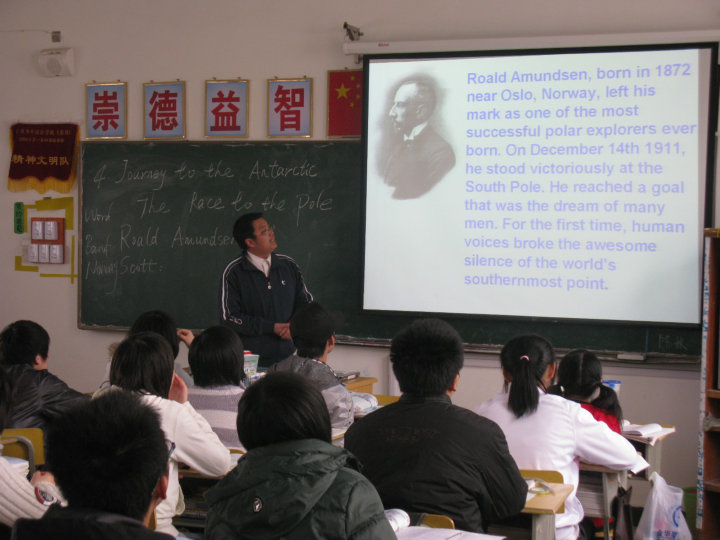
4 Journey to the Antarctic
Reading
Before you start
○1 Look at the title and photos and guess the answers to these questions.
1 Which pole did they race to?
2 When did they go?
3 Who reached the pole first?
Read to learn
○2 Now read the text quickly to check your guesses.
T h e R A C E t o t h e P O L E
1 On 1 June, 1910, Captain Scott left London to begin his journey to the Antarctic. On his way, he received a message from the Norwegian explorer Roald Amundsen : I’m going South.” So the race to the South pole was on !
5 During the polar summer of 1910-1911,both teams organized food bases in preparation for their journeys the next year. Then came the total darkness of the polar winter. Scott and Amundsen waited anxiously for spring. Amundsen was the first to leave on 15 October,1911.
10 He had teams of dogs pulling the sledges and all his men were on skis, Because of those ,he made rapid progress. Scott left on 1 November and soon had problems. First, his two sledges broke down, and then the horses began to have serious difficulties with the snow and the cold. After
15 a while, Scott and his men had to push the sledges themselves.
Amundsen reached the pole on 14 December and put a Norwegian flag there. Then he prepared for the return journey. Scott finally arrived at the pole with four team
20 members on 17 January. They were shocked when they saw the Norwegian flag. Scott wrote sadly in his diary: Well, we have now lost the goal of our ambition and must face 800 miles of hard pushing-and goodbye to most of our dreams.”
25 The return journey was one of the worst in the history of exploration, The men were soon exhausted and were running out of food .The weather conditions were terrible. Scott started to realize their hopeless situation: …we are very cheerful, but what each man feels in his
30 heart I can only guess. putting on our shoes in the morning is getting slower and slower.”
However, on their way back they found time to look for rocks. They carried 20 kilos of rocks all the way with them. Later , these rocks proved that at one time in the
35 distant past the Antarctic was covered by plants.
Then, disaster soon came. Edgar Evans had a terrible disease and died after a bad fall. The next to go was Captain Oates, who was having great difficulty walking. Scott recorded his death:
40 “He said,` I am just going outside and I may be some time .`We knew that poor Oates was walking to his death, but though we tried to stop him, we knew that it was the act of a brave man and an English gentleman. We all hope to meet the end with a similar spirit, and certainly the end is not far.”
Scott and two of his team members carried on and got within eleven miles of one of their food bases. But then a terrible storm started and they could not leave their tent. Scott spent some of his last hours writing. He wrote a
50 letter full of sadness to his wife Kathleen: I could tell you lots and lots about this journey. what stories you would have for the boy…But what a price to pay,”
Scott’s diary also told the story of their end:
55 “We are getting weaker and weaker and the end can’t be far. It seems a pity, but I do not think I can write more.” the news of Scott’s death shocked the world. He had failed to win the race to the pole ,but the extraordinary
60 courage shown by Captain Scott and his men made them into heroes.
